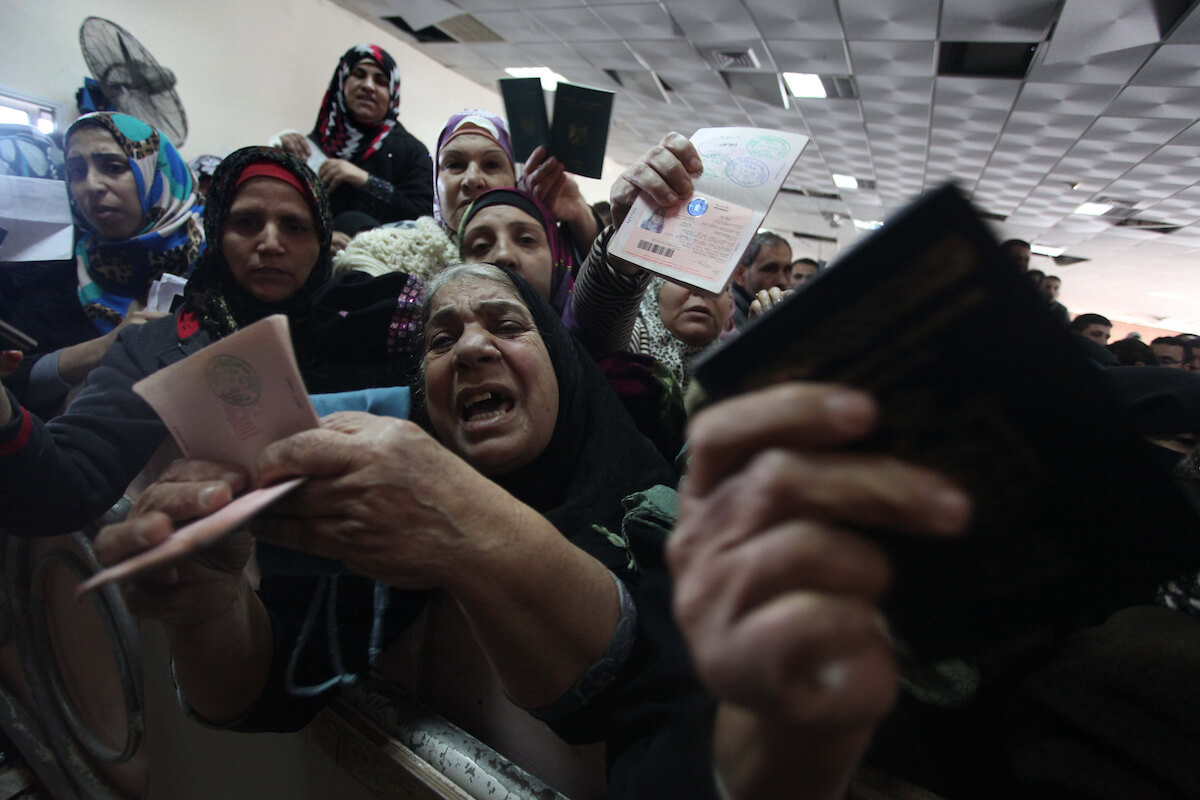The news of a possible rapprochement between Egypt and the Gaza Strip is welcomed by the Palestinian population of the besieged territory, as many yearn for an ease of the Egyptian-backed Israeli blockade, which has been firmly imposed for almost a decade, hindering imports and exports from the Strip.
A month ago, the Egyptian authorities invited businessmen and economists from Gaza to participate in the Ain Sokhna conference hosted by the National Center for Middle East Studies in Egypt to discuss potential changes in the commercial relationship with Gaza, in hopes of launching a new era of cooperation after years of preventing materials and commodities from entering the Palestinian territory.
Usama Khail, the head of the Palestinian Contractors Union and one of the conference’s attendees, said that preparations and discussions are underway to bridge the divide between Gaza and Cairo to end the dispute and work together to rebuild the relationship between the two parties.
“The conference has agreed on three parts of the plan: to open the Rafah crossing more frequently, to build an open commercial and industrial passage between the two territories, and to supply the Gaza Strip with water and electricity from the Egyptian side,” Khail said. He noted that prospects for opening the Rafah crossing are optimistic, as officials are waiting for the green light from Egyptian security authorities to approve the changes.
If things go as planned, Egypt will provide Gaza with 20 megawatts of energy in order to mitigate the electricity crisis, as well as a construction of a water plant to supply Gaza with clean water.
Egypt’s internal economic situation suffers from an acute crisis, including inflation, unemployment, and soaring rates of poverty, making such changes mutually beneficial. Gaza-based economic expert Maher el-Tabba says that Egypt is in desperate need for development and growth in its economy.
“Each year, Gaza spends three billion dollars on imports, most of which profits Israel as it controls the merchandise crossing into the Strip. Egypt can now take part in this process and redirect the profit,” al-Tabba said. He added that the ongoing blockade has caused a lack of manufacturing in Gaza, impeding the work inside local factories and rendering Gaza a big consumer.
In addition, the Egyptian pound is facing severe decline compared to the U.S. dollar, causing a general slowdown in the currency and local economy. When Gaza starts exchanging commodities from Egypt in the dollar, Egypt will receive more foreign currency, strengthening its own.
The possibility of constructing a free industrial trade zone between Egypt and the Gaza Strip will boost the economy in Egypt’s Sinai peninsula, as well as provide local citizens with work opportunities. The Sinai population suffers from underdevelopment, and often point their fingers at the Egyptian government for neglecting their needs. Growing dissatisfaction with Abdel-Fatah el-Sisi’s regime will likely to undermine his rule.
Ali el-Selmi, a former official at the Egyptian government said that Egypt welcomes proposals that can offer solutions to the current economic problems.
“The security and intelligence authorities in Egypt know very well that Gaza has never played any role in the unrest of the Sinai Peninsula, so I don’t think there are any factors that could deter this cooperation with Gaza, which would definitely benefit people on both sides,” el-Selmi added.

Why now?
The economic aspects of the deal are important, but they cannot alone explain why Egypt would make this shift in its relationship with Gaza.
According to the Palestinian political commentator, Faiez Abu Shamalah, the real reasons behind this sudden rapprochement between Gaza and Cairo is to undermine the president of the Palestinian Authority, Mahmoud Abbas, and usher in the post-Abbas era.
“Egypt, Jordan, Saudi Arabia, and the United Emirates all agreed to pave the way for the dismissed Fatah leader, Mohammed Dahlan, to play a significant role after Abbas’s departure. This proposal was decidedly rejected by Abbas because he refused to let his rival take his position,” Abu Shamalah states. “Yet, we have to be cautious over our optimism, as all of this remains in the realm of speculations if the Egyptian administration chooses not to move forward and put the new policy in place.”
Dahlan has maintained a positive presence in Gaza through some philanthropic activities such as distributing food parcels and arranging mass weddings for the youth in the impoverished coastal enclave.
Egypt has started to gradually cut relations with Abbas, and recently infuriated him with the sudden rapprochement with Gaza. Egypt wants Palestinians to attribute the most recent developments to Dahlan and encourage the Palestinian people to view him as a savior, the hero with the silver bullet to extricate Gaza from its troubles.



Zio-supremacists have promoted a vision in which a “demographic-threat”-dense Gaza is absorbed into Egypt while a less “demographically threatening” (and much more desirable) West Bank gets absorbed into Israel.
Egypt’s mending of relations with Gaza might hurt Abbas, but it might also successfully bolster and help to realize that Zio-supremacist vision.
Mr. Isra Saleh El-Namy, Egyptian regime is paid by USA to foster pro-Israeli factors; indeed, it’s the next biggest welfare recipient of US foreign military aid after Israel to do so–please put this factor in this article’s context for MW readers. Thanks.
Why did Israel occupy Gaza in 1967 ?
It was utterly ridiculous
Whatever happened to the gas fields discovered off Gaza in the late 1990`s:
https://www.google.co.uk/webhp?sourceid=chrome-instant&ion=1&espv=2&ie=UTF-8#q=gaza%20off%20shoe%20gas%20oil
Could it be that Israel is coveting this little goldmine and is thus not openly pushing for the re-absorption of Gaza and its millions of “terrorists” back into Egypt